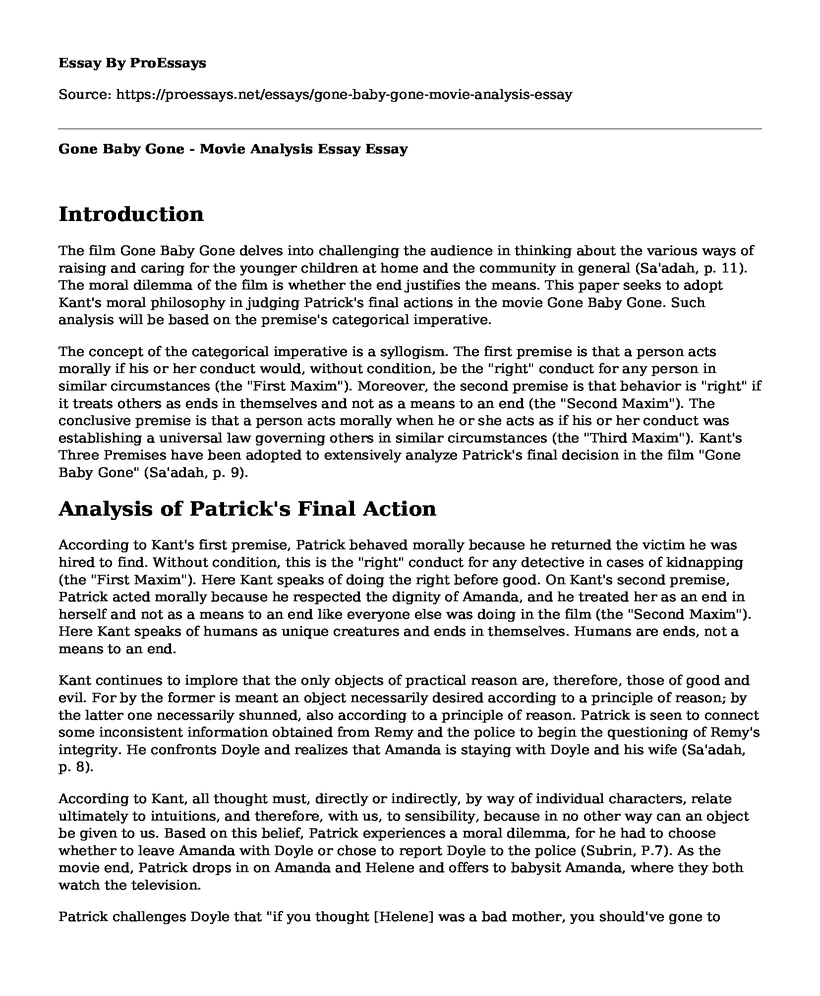Introduction
The film Gone Baby Gone delves into challenging the audience in thinking about the various ways of raising and caring for the younger children at home and the community in general (Sa'adah, p. 11). The moral dilemma of the film is whether the end justifies the means. This paper seeks to adopt Kant's moral philosophy in judging Patrick's final actions in the movie Gone Baby Gone. Such analysis will be based on the premise's categorical imperative.
The concept of the categorical imperative is a syllogism. The first premise is that a person acts morally if his or her conduct would, without condition, be the "right" conduct for any person in similar circumstances (the "First Maxim"). Moreover, the second premise is that behavior is "right" if it treats others as ends in themselves and not as a means to an end (the "Second Maxim"). The conclusive premise is that a person acts morally when he or she acts as if his or her conduct was establishing a universal law governing others in similar circumstances (the "Third Maxim"). Kant's Three Premises have been adopted to extensively analyze Patrick's final decision in the film "Gone Baby Gone" (Sa'adah, p. 9).
Analysis of Patrick's Final Action
According to Kant's first premise, Patrick behaved morally because he returned the victim he was hired to find. Without condition, this is the "right" conduct for any detective in cases of kidnapping (the "First Maxim"). Here Kant speaks of doing the right before good. On Kant's second premise, Patrick acted morally because he respected the dignity of Amanda, and he treated her as an end in herself and not as a means to an end like everyone else was doing in the film (the "Second Maxim"). Here Kant speaks of humans as unique creatures and ends in themselves. Humans are ends, not a means to an end.
Kant continues to implore that the only objects of practical reason are, therefore, those of good and evil. For by the former is meant an object necessarily desired according to a principle of reason; by the latter one necessarily shunned, also according to a principle of reason. Patrick is seen to connect some inconsistent information obtained from Remy and the police to begin the questioning of Remy's integrity. He confronts Doyle and realizes that Amanda is staying with Doyle and his wife (Sa'adah, p. 8).
According to Kant, all thought must, directly or indirectly, by way of individual characters, relate ultimately to intuitions, and therefore, with us, to sensibility, because in no other way can an object be given to us. Based on this belief, Patrick experiences a moral dilemma, for he had to choose whether to leave Amanda with Doyle or chose to report Doyle to the police (Subrin, P.7). As the movie end, Patrick drops in on Amanda and Helene and offers to babysit Amanda, where they both watch the television.
Patrick challenges Doyle that "if you thought [Helene] was a bad mother, you should've gone to Social Service ... Short of that, [Helene]'s her mother, and that's where she belongs". (Subrin, P.9). The action by Patrick in dropping in on Helene and Amanda and babysitting Amanda demonstrates one hope left to them; that Patrick could fill the role that had been destroyed by the actions by Lionel as such Patrick conforms to Kant's belief that morality is not the doctrine of how we may make ourselves happy, but how we may make ourselves worthy of happiness.
Works Cited
Sa'adah, Naila Nur. "An Analysis of Characterization of the Main Characters in" Gone Girl" Movie Script By Gillian Flynn." (2017). Retrieved From http://repo.iain-tulungagung.ac.id/6852/
Subrin, Elisabeth. "Gone Baby Gone." Film Comment 46.4 (2010): 17. Retrieved from https://search.proquest.com/openview/087547df19d24aaac39daad537e837d9/1?pq-origsite=gscholar&cbl=24820
Cite this page
Gone Baby Gone - Movie Analysis Essay. (2023, May 06). Retrieved from https://proessays.net/essays/gone-baby-gone-movie-analysis-essay
If you are the original author of this essay and no longer wish to have it published on the ProEssays website, please click below to request its removal:
- "What Dreams May Come:" The Future of the Multimedia Theatre
- Essay Sample on Rehabilitation as a Better Solution Instead of Sending to Prison
- Essay Sample on Death of Pentheus and the Role of Women Figures
- Essay Sample on Evolution of Poetry Through the Centuries
- Essay Sample on Sick Around America: High Medical Bills in US Revealed
- Last Man Standing - Movie Analysis Essay
- Essay Example on The Beatles: How Did They Create Music Magic?







